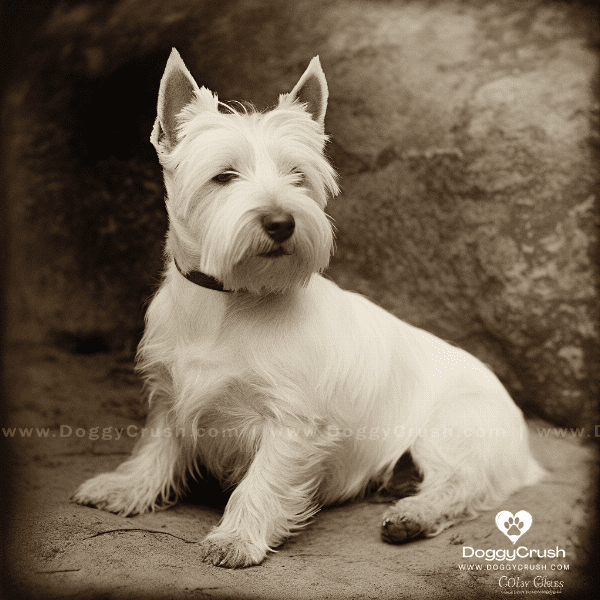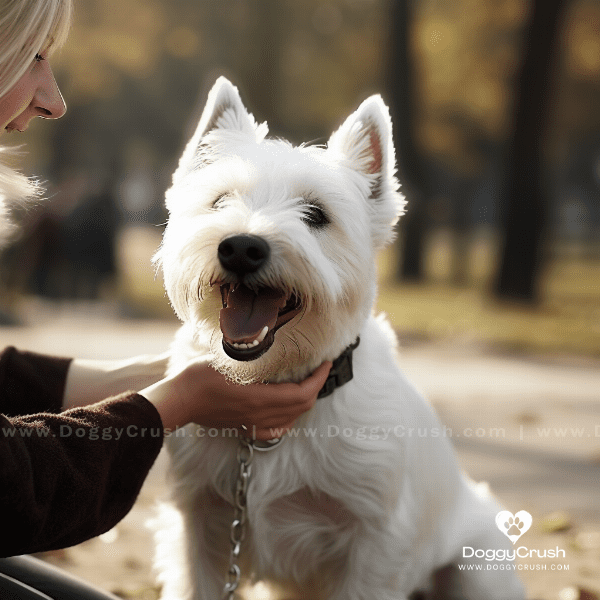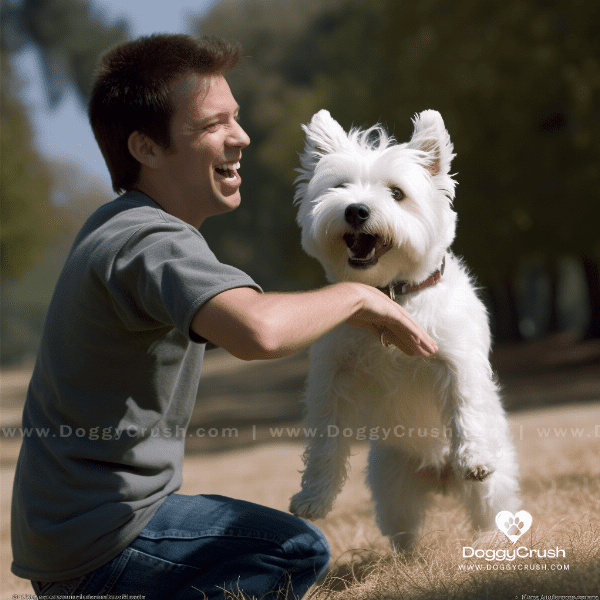Table of Contents
- History and Origin of West Highland White Terrier Dogs
- Physical Characteristics and Appearance
- Personality and Temperament
- Grooming and Maintenance Needs
- Training and Exercise Requirements
- Health Issues and Concerns
- Feeding and Nutrition Guidelines
- Choosing a West Highland White Terrier Dog
- Life with a West Highland White Terrier Dog
- Conclusion and Final Thoughts
History and Origin of West Highland White Terrier Dogs
West Highland White Terrier dogs, also known as “Westies,” are a beloved breed that originated in Scotland in the mid-19th century. They were developed to hunt small game, such as rodents, foxes, and badgers. The breed was recognized by the Kennel Club in 1907 and has since become a popular companion animal.
Ancestors of West Highland White Terrier Dogs
The Westie’s ancestors were a group of small, rough-coated terriers that were bred to work in the harsh terrain of the Scottish Highlands. These dogs were prized for their ability to hunt vermin and were often used by farmers and gamekeepers.
One of the Westie’s closest relatives is the Cairn Terrier, which is a similar-looking breed with a darker coat. The two breeds were often interbred in the early days of their development, and it is thought that the Westie may have been created by selectively breeding Cairns with a white coat.
Development of the White Coat
Initially, the Westie was bred with a variety of coat colors, including brown, black, and brindle. However, a white coat soon became the most desirable, as it made the dogs easier to spot in the field. The first recorded instance of a white Westie being bred was in the 1850s by Colonel Edward Donald Malcolm of Poltalloch, a Scottish estate owner.
Popularity of West Highland White Terrier Dogs
The West Highland White Terrier quickly gained popularity as a companion animal, thanks to their friendly and affectionate nature. The breed became even more well-known in the 1930s, thanks to a series of advertisements for Black & White Scotch Whisky that featured a Westie named “Rufus.”
Today, the West Highland White Terrier remains a popular breed around the world, prized for their spunky personalities and adorable appearance. Whether they are hunting vermin or lounging on the couch, these little dogs bring joy and companionship to countless families.

Physical Characteristics and Appearance
West Highland White Terrier dogs are a small, sturdy breed with a distinctive white coat and a playful, energetic personality. Here are some of the key physical characteristics and appearance traits that make this breed so unique.
Size and Build
Westies are typically between 10-12 inches tall at the shoulder and weigh between 15-20 pounds. They have a compact, muscular build with short legs and a deep chest. Their heads are rounded with a short muzzle and dark, expressive eyes.
Coat and Color
The Westie’s coat is one of their most defining features. They have a double coat, consisting of a soft undercoat and a harsh, wiry outer coat that helps protect them from the elements. Their coat is always white and requires regular grooming to keep it looking its best.
Tail and Ears
Westies have a short, straight tail that is usually carried upright. Their ears are small and pointed, and they stand erect on the top of the dog’s head. This gives them an alert, curious expression that is characteristic of the breed.
Facial Features
The Westie’s face is one of its most charming features. They have dark, expressive eyes that are set deep in their head, giving them a keen and intelligent expression. Their muzzle is short and broad, with a strong jaw and sharp teeth that reflect their hunting ancestry.
Overall Appearance
The West Highland White Terrier is a compact and sturdy breed that exudes confidence and energy. They have a bright, cheerful personality that is matched by their charming appearance. From their perky ears to their wagging tail, every aspect of this breed’s physical appearance reflects their playful and affectionate nature.

Personality and Temperament
West Highland White Terrier dogs are known for their spunky, outgoing personalities and affectionate nature. Here are some of the key personality and temperament traits that make this breed so beloved.
Playful and Energetic
Westies are highly energetic and love to play. They are always up for a game of fetch or a walk in the park and can be very enthusiastic about outdoor activities. They are known for their lively and curious personalities and are always ready for a new adventure.
Confident and Independent
Despite their small size, Westies are confident and independent dogs. They have a strong sense of self and are not easily intimidated by larger dogs or unfamiliar situations. They can be quite stubborn at times, but this is a reflection of their independent nature rather than any sort of disobedience.
Affectionate and Loyal
Westies are very affectionate dogs and thrive on human companionship. They love to snuggle and are always eager to please their owners. They are fiercely loyal and will do anything to protect their family, making them great watchdogs despite their small size.
Intelligent and Trainable
West Highland White Terrier dogs are highly intelligent and quick learners. They respond well to positive reinforcement training methods and enjoy learning new tricks and commands. They can also be quite adept at problem-solving and can be taught to perform a variety of tasks.
Social and Friendly
Westies are social dogs that enjoy being around people and other animals. They are typically friendly and outgoing, although some individuals can be more reserved or shy. They make great family pets and are often good with children, although they may need some training to learn how to interact appropriately with young kids.
Overall, the West Highland White Terrier is a delightful breed with a personality and temperament that is sure to win the hearts of all who meet them. From their playful and energetic nature to their affectionate and loyal personalities, these dogs are truly one-of-a-kind.

Grooming and Maintenance Needs
West Highland White Terrier dogs have a beautiful and distinctive white coat that requires regular grooming to keep it looking its best. Here are some of the key grooming and maintenance needs for this breed.
Coat Care
The Westie’s coat is harsh and wiry, with a soft undercoat that sheds minimally. To keep the coat in top condition, it needs to be brushed at least once a week to remove any tangles or mats. They also need to be bathed regularly, usually every 2-3 months, to keep their coat clean and shiny.
Trimming
To maintain their distinctive appearance, Westies need regular trimming of their coat. This includes trimming the hair around their eyes and ears, as well as shaping their overall coat. Most owners opt to have a professional groomer trim their dog’s coat, as it can be quite challenging to do at home.
Nails and Teeth
Westies also need regular nail trimming to keep their nails from getting too long and causing discomfort or injury. They should have their teeth brushed at least a few times a week to prevent tooth decay and bad breath.
Ears and Eyes
Westies are prone to ear infections, so it’s important to check and clean their ears regularly. Their eyes should also be cleaned daily to prevent any discharge from building up and causing irritation.
Exercise and Nutrition
In addition to grooming needs, West Highland White Terrier dogs also require regular exercise and proper nutrition. They should be fed a high-quality dog food that is appropriate for their age and activity level, and they should have plenty of opportunities to exercise and play each day.
Overall, West Highland White Terrier dogs are relatively low-maintenance when it comes to grooming and maintenance needs. With regular care and attention, they can live long and healthy lives, bringing joy and companionship to their owners for years to come.

Training and Exercise Requirements
West Highland White Terrier dogs are highly intelligent and trainable, but they can also be quite stubborn at times. Here are some key training and exercise requirements for this breed.
Early Socialization
Westies should be socialized from a young age to help them develop into well-adjusted and confident adults. This includes exposing them to different people, animals, and situations to help them learn how to interact appropriately with the world around them.
Positive Reinforcement Training
Westies respond best to positive reinforcement training methods, such as rewards and praise for good behavior. Harsh or punitive training methods can be counterproductive and may lead to negative behaviors, such as aggression or anxiety.
Basic Obedience Training
Basic obedience training is essential for all dogs, including Westies. This includes teaching them to come when called, walk on a leash, and obey basic commands such as sit, stay, and down. With consistent training and practice, most Westies can learn these commands quickly and easily.
Exercise Needs
Despite their small size, Westies require regular exercise to stay healthy and happy. They should be taken for daily walks or play sessions to help burn off excess energy and prevent boredom. They also enjoy games such as fetch or agility, which can help keep them mentally stimulated as well as physically fit.
Mental Stimulation
Westies are intelligent dogs that enjoy learning new things and solving puzzles. Providing them with mental stimulation, such as interactive toys or training games, can help keep them engaged and prevent destructive behavior.
Consistency and Patience
Training a West Highland White Terrier requires patience, consistency, and a lot of positive reinforcement. With the right approach and plenty of practice, however, these dogs can become well-behaved and obedient companions that bring joy and companionship to their owners for years to come.

Health Issues and Concerns
West Highland White Terrier dogs are generally healthy and long-lived, with a lifespan of 12-16 years. However, like all breeds, they are prone to certain health issues and concerns. Here are some of the key health issues that owners of Westies should be aware of.
Skin Conditions
Westies are prone to skin allergies and irritations, which can cause itching, redness, and hair loss. Regular grooming and proper nutrition can help reduce the risk of skin problems, but some dogs may require medication or special diets to manage these conditions.
Dental Issues
Like many small breeds, Westies are prone to dental issues such as tartar buildup and tooth decay. Regular teeth cleaning and dental checkups can help prevent these problems and keep your dog’s mouth healthy.
Eye Problems
Westies are also prone to certain eye problems, such as cataracts, glaucoma, and dry eye. Regular eye exams can help detect these issues early, making them easier to treat.
Patellar Luxation
Patellar luxation, or kneecap dislocation, is a common condition in many small breeds, including Westies. This occurs when the kneecap slips out of place, causing pain and discomfort. Surgery may be required to correct this issue in severe cases.
Liver Disease
Some Westies may be prone to liver disease, such as copper toxicosis, which can cause liver failure if left untreated. Regular blood tests and liver function tests can help detect these conditions early, making them easier to manage.
Breathing Issues
Some Westies may be prone to breathing issues, such as tracheal collapse or respiratory infections. Keeping your dog at a healthy weight and providing them with plenty of exercise and mental stimulation can help reduce the risk of these problems.
Overall, with proper care and attention, most West Highland White Terrier dogs can live long and healthy lives, bringing joy and companionship to their owners for many years. Regular veterinary checkups and a good diet and exercise routine can help keep your dog healthy and happy.

Feeding and Nutrition Guidelines
Proper nutrition is essential for the health and well-being of West Highland White Terrier dogs. Here are some key feeding and nutrition guidelines to help keep your dog healthy and happy.
High-Quality Dog Food
Westies should be fed a high-quality dog food that is appropriate for their age, activity level, and size. Look for a dog food that contains high-quality protein sources, such as chicken or fish, and is free from fillers or artificial preservatives.
Portion Control
Portion control is important to prevent obesity and other health issues. Westies should be fed smaller, more frequent meals throughout the day rather than one large meal. Consult with your veterinarian to determine the appropriate portion size for your dog.
Treats and Table Scraps
While it can be tempting to give your Westie treats or table scraps, these should be given in moderation. Too many treats or table scraps can lead to weight gain and other health issues.
Hydration
Westies should have access to fresh, clean water at all times. Dehydration can lead to health problems, so it’s important to make sure your dog is drinking enough water each day.
Food Allergies
Some Westies may be prone to food allergies or intolerances. If your dog exhibits signs of gastrointestinal distress, such as vomiting or diarrhea, after eating a particular food, it may be necessary to switch to a different brand or type of food.
Nutritional Supplements
Some Westies may benefit from nutritional supplements, such as joint supplements or probiotics. Consult with your veterinarian to determine if these supplements are appropriate for your dog’s individual needs.
Overall, providing your West Highland White Terrier with a balanced and nutritious diet is essential for their health and well-being. With proper feeding and nutrition, these dogs can live long and healthy lives, bringing joy and companionship to their owners for many years to come.

Choosing a West Highland White Terrier Dog
If you’re considering adding a West Highland White Terrier dog to your family, there are several factors to consider. Here are some key things to keep in mind when choosing a Westie.
Breed Characteristics
West Highland White Terriers are known for their spunky, energetic personalities and affectionate nature. They are also highly intelligent and trainable, but can be quite stubborn at times. Consider whether these traits are a good match for your lifestyle and personality.
Breeder or Rescue
When choosing a Westie, you have the option of getting one from a breeder or adopting from a rescue organization. If you choose to go with a breeder, be sure to research and choose a reputable breeder who prioritizes the health and well-being of their dogs.
Health History
Before bringing home a Westie, be sure to ask about their health history and any potential health issues. A reputable breeder or rescue organization should be able to provide you with this information.
Socialization and Training
Socialization and training are essential for all dogs, including Westies. Consider whether you have the time and resources to properly socialize and train your dog, or whether you will need to enlist the help of a professional trainer.
Environment and Space
Westies are relatively small dogs, but they still require plenty of space to play and exercise. Consider whether your living situation and environment are suitable for a Westie.
Time and Attention
Westies thrive on human attention and companionship, and require daily exercise and mental stimulation. Consider whether you have the time and energy to provide your dog with the attention and care they need.
By considering these factors and doing your research, you can make an informed decision when choosing a West Highland White Terrier dog that is the perfect match for you and your family.

Life with a West Highland White Terrier Dog
West Highland White Terrier dogs make wonderful companions and are well-suited to a variety of living situations. Here are some things to keep in mind when sharing your life with a Westie.
Exercise and Activity
Westies are active dogs that require daily exercise and mental stimulation. They enjoy games such as fetch and agility, and love going for walks or hikes. Providing your Westie with plenty of opportunities for exercise and play can help prevent destructive behaviors and promote good health.
Grooming and Maintenance
Westies have a distinctive white coat that requires regular grooming to keep it looking its best. They also need regular nail trimming, teeth cleaning, and ear cleaning to maintain their overall health and well-being. By staying on top of your Westie’s grooming and maintenance needs, you can help them look and feel their best.
Training and Socialization
Proper training and socialization are essential for Westies to thrive. They respond well to positive reinforcement training methods and enjoy learning new tricks and commands. Socialization is also important to help your Westie learn how to interact appropriately with people and other animals.
Health and Nutrition
Maintaining your Westie’s health and well-being requires regular veterinary checkups and proper nutrition. Providing your Westie with a high-quality dog food that is appropriate for their age and activity level can help prevent health problems down the line.
Companionship and Affection
Westies are social dogs that thrive on human companionship and affection. They make great family pets and are often good with children, although they may need some training to learn how to interact appropriately with young kids. By providing your Westie with plenty of love and attention, you can help ensure they are happy and well-adjusted.
Overall, life with a West Highland White Terrier dog can be a rewarding and fulfilling experience. By providing them with proper care, attention, and training, you can enjoy many years of companionship and joy with your furry friend.

Conclusion and Final Thoughts
West Highland White Terrier dogs are a beloved breed known for their spunky personalities, affectionate nature, and distinctive white coat. While they require regular grooming and exercise, they are relatively low-maintenance and make wonderful family pets.
When choosing a Westie, it’s important to consider their breed characteristics, health history, and training needs. By providing them with proper care, attention, and training, you can help ensure they are happy and healthy for many years to come.
If you’re considering adding a West Highland White Terrier to your family, be sure to do your research and choose a reputable breeder or rescue organization. With patience, love, and a commitment to their well-being, you can enjoy a lifetime of companionship and joy with your furry friend.




